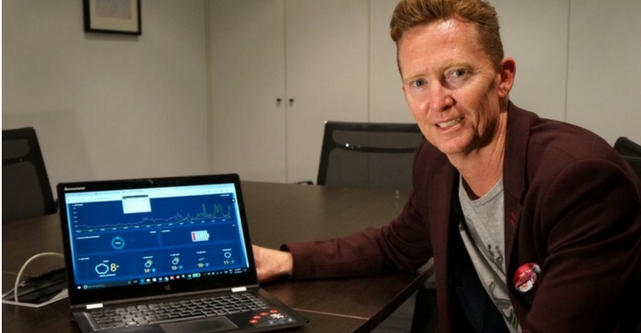
David Martin, Power Ledger co-founder and managing director. Source: Supplied
Perth-based energy trading startup Power Ledger has raised $17 million in the pre-sale stage of its initial coin offering’ (ICO), which was sold-out within 72 hours of becoming available to the public on the Ethereum cryptocurrency network.
Power Ledger allows households to trade excess solar power over the blockchain network, in an effort to make power more distributed and sustainable for consumers, according to co-founder and managing director David Martin.
The $17 million raised came from a public pre-sale of 100 million Power Ledger tokens — called POWRs — and a discounted private pre-sale of 90 million POWRs, which were all made available at 2pm on Sunday, August 27, and sold out 72 hours later, according to the startup.
Power Ledger will be launching up to a further 250 million POWRs in an uncapped public offer this month and Martin believes it is “not unreasonable to expect” that this next offer will bring the funds raised by Power Ledger in this ICO to between $20-30 million.
Martin says this ICO pre-sale has been a “fantastic result” for the startup not only financially but also in terms of garnering community support from blockchain enthusiasts, and Martin has “high hopes that support will continue”.
Read more: “Crowdfunding on steroids” — the new ‘initial coin offering’ craze explained
Martin was inspired to co-found the startup as a way to ensure the sustainability of Australia’s energy future. He, along with his four other co-founders, want to do this by creating an “[energy] framework that encouraged people to stay connected” at a time when rising energy prices are still provoking national debate.
“I was concerned that as soon as energy storage became cheap enough, customers who could afford it would leave the energy network, and as we got more and more distributed renewables in the system, it was going to be harder to manager the power quality [of the energy network],” Martin tells StartupSmart.
Awareness has been growing about blockchain technology in Australia, including among parliamentarians, and Martin says the platform was crucial in developing the Power Ledger platform.
“The blockchain provided a clear, secure and immutable record of [energy] transactions, and became the ideal platform for energy trading,” Martin explains, adding that the “community demand has been really strong” from blockchain users around the globe.
Power Ledger previously raised an undisclosed amount of funding from a “cornerstone investor” late last year. Martin says the funds raised from this ICO will be used to “spread the platform as broadly and quickly as we can,” and expand the startup’s team of 12 to ensure more business development capability.
This successful pre-sale raise comes as Power Ledger last week launched its first commercial deployment of the system in a housing development in Fremantle, according to Martin, who says the startup is already in talks with energy providers and tech companies in the US, Asia and Europe about establishing the platform’s presence internationally.
Power Ledger’s platform is already “fully commercially deployed and supported by leading energy providers”, which include Vector NZ, Western Power WA and TAS networks, according to the company.
“The consumer themselves are the ultimate disruptor”
Disruption of the energy sector has “already started”, according to Martin, who warns energy incumbents will have to innovate their offerings to please increasingly-savvy Australian consumers.
“Consumers now expect a very different response and engagement with their energy supply: energy supply in the future needs to achieve the dual goals of low cost and low carbon,” Martin says.
“The consumer themselves are the ultimate disruptor,” Martin says, who believes “the genie is out of the bottle” when it comes to this new wave of energy-disrupting consumers.
“People have said, ‘I don’t want to buy energy from a coal-fired station'”, Martin says, explaining that the success of Power Ledger’s ICO pre-sale shows that “consumers are saying this model of energy transaction is what they want to participate in”.
“The concept of peer-to-peer [energy] trading is something that has universal appeal to customers … it’s a demonstration that the community wants to be part of the power economy of the future,” he says.
The idea of a distributed power system that allows consumers to buy and sell energy among themselves without the intermediary of a power-grid is a “global phenomena”, according to Martin, who warns the energy industry needs to “come to terms with rapid change” in the future.
“Consumers are making those decisions themselves, and it’s something the traditional industry players need to wake up to.”
Follow StartupSmart on Facebook, Twitter, LinkedIn and iTunes.


COMMENTS
SmartCompany is committed to hosting lively discussions. Help us keep the conversation useful, interesting and welcoming. We aim to publish comments quickly in the interest of promoting robust conversation, but we’re a small team and we deploy filters to protect against legal risk. Occasionally your comment may be held up while it is being reviewed, but we’re working as fast as we can to keep the conversation rolling.
The SmartCompany comment section is members-only content. Please subscribe to leave a comment.
The SmartCompany comment section is members-only content. Please login to leave a comment.